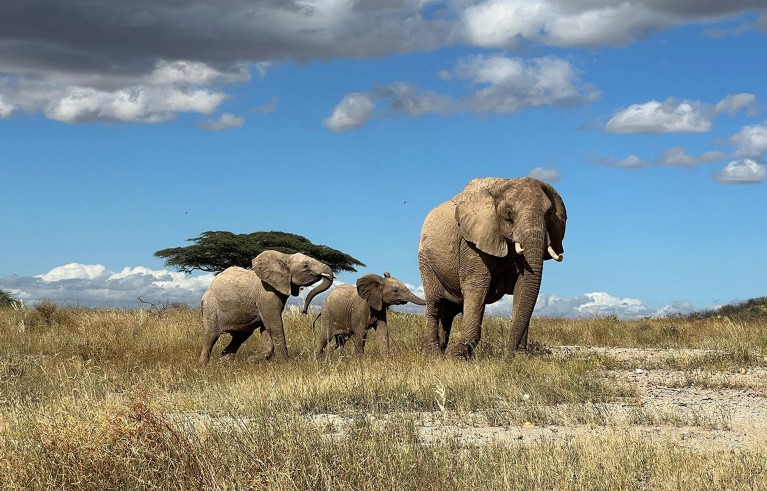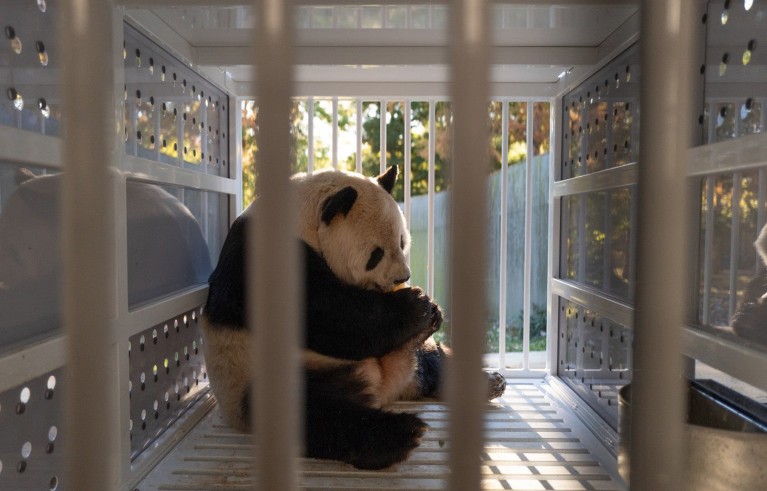Hello Nature readers, would you like to get this Briefing in your inbox free every day? Sign up here.

What’s in a name? The elephant humans have named ‘Desert Rose’ might respond more readily if her specific elephant rumble was used.Credit: George Wittemyer
Elephants seem to use proper names to address their fellows — a habit that appears to otherwise be unique to humans. Scientists used machine learning to analyse 469 deep rumbles made by wild female African savannah elephants (Loxodonta africana) and their families in Kenya. They found patterns that indicate that calls are specific to individuals. The researchers also played recorded calls to elephants out in the field and watched how the animals responded. “They could tell if a call was addressed to them just by hearing that call,” says behavioural ecologist and study co-author Michael Pardo.
Reference: Nature Ecology & Evolution paper or read the authors’ own summary in the Nature Ecology & Evolution research briefing (6 min read)
“I had no choice but to commit [research] misconduct,” admits a researcher at an elite Chinese university. The shocking revelation is documented in a collection of several dozen anonymous, in-depth interviews offering rare, first-hand accounts of researchers who engaged in unethical behaviour. The study co-authors — sociologist Zhang Xinqu and criminologist Wang Peng — suggest that researchers felt compelled, and even encouraged, to engage in misconduct to protect their jobs. This pressure, they conclude, ultimately came from the Double First-Class Initiative, a Chinese programme to create globally recognized universities.
Reference: Research Ethics paper
An advisory committee to the US Food and Drug Administration (FDA) unanimously recommended that the agency approve Eli Lilly’s donanemab for Alzheimer’s disease. In trials, the drug slowed cognitive decline by around 35% over 18 months in people with mild to moderate disease. This rate is similar to that seen in rival drug lecanemab, which the FDA approved last year. The advisers recommended more research on whether donanemab is effective in people at varying stages of the disease and in people of colour.
Reference: Peripheral and Central Nervous System Drugs Advisory Committee report
The European Green Party suffered losses and far-right parties made gains in last week’s European Parliament elections. The outcome suggests that climate change is less of a priority for voters across the bloc amid the cost-of-living crisis and Russia’s invasion of Ukraine. But the new parliament is unlikely to dismantle Europe’s key climate goals, say researchers. “When you look at polling data, there’s not much climate scepticism left in Europe,” says environmental economist Aurélien Saussay.
Features & opinion
By the end of this year, close to half of the global population will have gone to the polls — the biggest manifestation of the democratic process in history. Psephologists — researchers who study public sentiment and voting patterns — will be spoiled for the data they use to understand the political lie of the land. Pollsters will try to predict who will vote, and for whom. Psephological predictions can also offer a glimpse of future government policies relevant to funding and other research interests.
Andrew Robinson’s pick of the top five science books to read this week includes the last book by influential environmentalist James Lovelock, an exploration of the act of culling wild animals and a call for guardrails in the age of artificial intelligence.
Lurking in London’s Kew Gardens is the world’s largest fungarium. This collection of 1.3 million specimens includes around half of all the species known to science. Inside, mycologists delve into how the organisms sequester carbon, nourish the root systems of other plants and otherwise influence critical ecosystems.
Image of the week

Giant panda Tian Tian enjoys a frozen treat in his travel crate.Credit: Roshan Patel/Smithsonian’s National Zoo
Giant panda Tian Tian enjoys a frozen treat in his travel crate during his journey from Smithsonian’s National Zoo to China. As the zoo prepares to welcome two giant pandas (Ailuropoda melanoleuca) from China, its director Brandie Smith discusses the departure of their predecessors: Tian Tian, Mei Xiang and their cub, Xiao Qi Ji. “Shipping three large herbivores halfway round the world when there is no margin for error is a huge undertaking. There are so many moving parts and the entire focus is on the well-being of these animals,” says Smith. “It didn’t really hit me until I went into the panda house a couple of days after they had left — that was the saddest time,” she adds. (Nature | 9 min read)
Today I’m tittering at an effort by philosophers Michael Townsen Hicks, James Humphries and Joe Slater in Ethics and Information Technology to re-cast artificial-intelligence ‘hallucinations’ with a much less flattering (and, be warned, a bit sweary) name. They argue that these falsehoods are better understood with reference to philosopher Harry Frankfurt’s humorous and incisive bestseller, On Bullshit.
Help us keep this newsletter BS-free by sending us your feedback on your favourite topics for us to cover. Your e-mails are always welcome at briefing@nature.com.
Thanks for reading,
Flora Graham, senior editor, Nature Briefing
With contributions by Smriti Mallapaty and Sara Reardon
Want more? Sign up to our other free Nature Briefing newsletters:
• Nature Briefing: Microbiology — the most abundant living entities on our planet — microorganisms — and the role they play in health, the environment and food systems.
• Nature Briefing: Anthropocene — climate change, biodiversity, sustainability and geoengineering
• Nature Briefing: AI & Robotics — 100% written by humans, of course
• Nature Briefing: Cancer — a weekly newsletter written with cancer researchers in mind
• Nature Briefing: Translational Research — covers biotechnology, drug discovery and pharma

